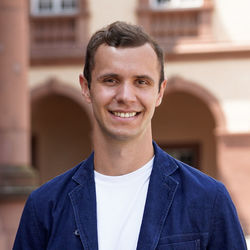Master’s Program in Economics
Program facts and information
Degree: Master of Science (M.Sc.)
Standard period of study: 4 semesters (2 years)
ECTS credits: 120–126
(introductory phase: 30 ECTS credits, elective modules in the advanced phase: 90–96 ECTS credits)Language of instruction: English
Language proficiency: English; for further information on the required proof of language proficiency see “Admission requirements and selection”
Program start: Fall semester (September)
Academic calendarSchool: School of Law and Economics, Department of Economics
Semester fee: EUR 194 (more information)
Tuition fees for international students from non-EU countries: EUR 1,500
Tuition fees for a second degree: EUR 650Program overview
The master's program in Economics is taught completely in English. It is guided by a qualitative approach and based on mathematical key principles. Methodical as well as theoretical specialist knowledge is imparted in three specializations in the advanced phase which are structured differently in terms of content and structure. The program is therefore aimed both at those who are interested in a career in business and those who wish to embark on an academic career.
In the introductory phase, advanced knowledge in macro- and microeconomics as well as in econometrics is imparted. Our students are thus perfectly prepared to deal with theoretical and empirical work in economics and related fields in an independent, systematic and well-founded manner. In addition, necessary theories and methods for the further course of studies are imparted.
The further course of study depends on the specialization chosen in the advanced phase:
- Students of the Economics track have the opportunity to choose their own specializations and to also take modules from neighboring programs of study programs, such as the Mannheim Master in Management program or the master’s programs of the School of Social Sciences (Sociology and Political Science).
- The Competition and Regulation Economics (CaRE) track offers students the opportunity to take tailor-made, interdisciplinary courses in the field of competition and regulation, thus focusing on topics combining law and economics.
- The Research track offers students the possibility to develop their academic profile in advanced doctoral courses.
As a rule, the master’s degree concludes with the master's thesis. Each student is mentored by an academic staff member from the department.
Why study Economics at the University of Mannheim?
Studying in Mannheim means studying at one of the most renowned institutions for Economics in Europe. Independent national and international rankings have confirmed the outstanding quality of research and teaching at our university on a number of occasions. The Department of Economics is repeatedly ranked as top university in the CHE University Ranking, the QS World University Ranking by Subject, the Time Higher Education Ranking or the 2019 THE Europe Teaching Rankings.
The University of Mannheim is part of a global network: Students enrolled in the master's program in Economics have the opportunity to participate in the double degree program ENTER Research Masters and to obtain a double degree at a renowned European partner university.
Outstanding students can also directly join the doctoral program in Economics at the Graduate School of Economics and Social Sciences (GESS) in Mannheim and thus save two years compared to the duration of a conventional combination of a master's degree and a subsequent doctoral program.
Our teachers have leading positions in various fields of research. In addition, the Department of Economics cooperates with well-known companies and institutions such as the neighboring Center for European Economic Research (Zentrum für Europäische Wirtschaftsforschung, ZEW), the German Monopolies Commission and the Competition Commission of Singapore.
Career opportunities
Economists may be employed wherever an understanding of economic issues is required.
Depending on their specialization, they can work, for example, in ministries and international organizations, in politics, or in the banking and insurance sectors. Administrative departments at federal, state and community institutions, the European Central Bank, the Bundesbank, the Federal Statistical Office, and treasuries and associations are some of the most important employers for economists. In addition, it is possible to work in business consulting or business journalism.
Economists can also pursue a career in academia either in Germany or abroad.
Required interests and skills
Students of the master’s program in Economics should
- be interested in economic issues and scientific research,
- have a solid basic knowledge of mathematics, macro- and microeconomics, econometrics and statistics,
- be not afraid of in-depth study of models, theories, data sets and statistical software,
- be capable of abstract thinking, have sound analytical skills and the ability to reason,
- be able to write and speak clearly.
Program structure
Module catalog
The module catalog gives you an overview of the courses and their content.Studying abroad
During the master's program, spending a semester abroad is optional. If you would like to study abroad, you have various options.The University of Mannheim is well-connected internationally, and has around 450 partner universities around the world. Students enrolled in the master's program in Economics can thus apply not only for university-wide programs but also for program-specific placements, for example at the Hong Kong University of Science and Technology (HKUST).
In addition, they have the opportunity to participate in the double degree program ENTER Research Masters and to obtain a double degree at a renowned European partner university.
Internships
Completing an internship during the master’s program in Economics is optional. If you would like to do a voluntary internship, the School of Law and Economics, thanks to its strong business contacts, will be in the best position to assist you with the organization. For example, the Department of Economics arranges tailor-made internships with our cooperation partners for students in the Competition and Regulation and Economics tracks.Continuing Education
Certificate programs
Strengthen your potential, deepen your knowledge, find solutions for challenges we will face tomorrow – there are many good reasons to think outside the box, get to know and try out new things even during your studies.At the University of Mannheim, you can do this in the “Studium Oecologicum” which focuses on sustainability. In our certificate program, you will acquire interdisciplinary expert knowledge which can help you to act ethically and to make holistic decisions.
Language courses
Making language learning easier: No matter if you want to learn Japanese, Hebrew, Spanish or Norwegian, take the Graduate Record Examination Test (GRE), The European Language Certificates (telc) or the TOEFL test – each semester, the University of Mannheim offers language courses and language certificates in more than 16 languages for students and non-university members, online and on campus!Studium Generale
Are you interested in IT or communication trainings or theater, music, or drawing courses? Studium Generale has a vast range of courses available to all.Doctorates
Outstanding students can also directly join the doctoral program in Economics at the Graduate School of Economics and Social Sciences (GESS) in Mannheim and thus save two years compared to the duration of a conventional combination of a master's degree and a subsequent doctoral program.
Graduates of the master’s program in Economics have a very good chance of gaining a doctoral position at a chair or in a renowned doctoral program.
Doctoral programs and opportunities at the Department of Economics
General information on doctoral studies at the University of MannheimAdmission requirements and selection
In our selection process, we take numerous criteria into account. For more details, please check the selection statutes (see below). Be bold! Please do not hesitate to contact us if you need advice. We are looking forward to receiving your application!
Admission requirements
If you have not yet completed your bachelor’s degree, you may still apply for a master’s program as long as will provide a proof that you have obtained at least 120 ECTS credits.
- Completion of a bachelor’s program in Economics, or a bachelor’s program recognized as equivalent, with a grade of “good” or better (equivalent to the German grade of 2.5) at a German or national higher education institution (also Berufsakademie), corresponding to at least 180 ECTS credits or a regular period of study of at least three years
- Proof of proficiency in English (may be submitted by 15 August)
Selection criteria
- The final grade or – for students still completing their degree – the grade average of the bachelor’s program
- Letter of motivation (in German or English, 2-page maximum)
- Essay (in German or English, 25-page maximum)
Selection statutes
Under “Admission requirements and selection” we have compiled the most important selection criteria of the program for you. For more detailed explanations of the selection process and the legally binding requirements of the degree program, please refer to the selection statutes.Application
Scholarships and funding
The university offers various funding opportunities. Around 200 Mannheim students receive scholarships every year, which are intended to give them the freedom to focus on their academic achievements or to continue their voluntary work alongside their studies. Find out more about the funding opportunities and feel free to apply, for example, for the Deutschland Scholarship, the Opportunity Mannheim Scholarship or the Elite Sports Scholarship Rhine-Neckar Metropolitan Region.Funding opportunities for international degree-seeking students
Application deadline
The application deadline for fall semesters starts on 1 April and ends on 15 May.It is not possible to apply for the spring semester.
Contact

Sebastian Herdtweck (he/him)
Department of Economics
L 7, 3–5 – Room 405
68161 Mannheim
Personal consultation hours: Tue and Wed, 9:30 – 11:30
Telephone availability: Tue and Wed, 9:30 – 16:30

Admissions Office
L 1, 1 – Room 157, 158
68161 Mannheim



